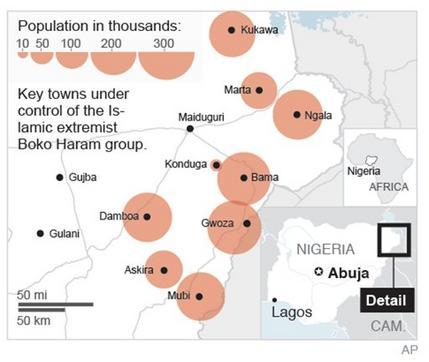Nigerians flee as Islamic extremists dig in

Map locates towns under control of Boko Haram in Nigeria, AP Photo/f.duckett
By IBRAHIM ABDULAZIZ and MICHELLE FAUL
Associated Press
YOLA, Nigeria (AP) -- Thirteen-year-old Sulaiman wanders the streets of Nigeria's northeastern town of Yola, hungry, dusty and frightened. He has walked through the bush for days after Islamic extremists seized his hometown, Uba, killing many and leaving the rest in a state of shock as they raised their black and white flag.
"They slaughtered my father, killed my two brothers and abducted my mother and her sister," said the tearful teenager, who identified himself only as Sulaiman.
Insurgents in northern Nigeria have intensified their struggle to create an Islamic caliphate in recent weeks, seizing towns and cities spread over an estimated 20,000 kilometers (7,700 square miles) along the border with Cameroon. The area is the size of the U.S. state of Maryland and it used to be home to more than 2 million people but many have now fled because the Boko Haram extremists kill young men who won't join their cause and chop off the hands of alleged looters.
Sulaiman is among the more than 350 schoolchildren now missing from the commercial center of Mubi and its surrounding towns, including Uba, school principals and an education official said.
The students were all at schools when Boko Haram fighters drove into town in pickup trucks and on motorbikes, firing anti-aircraft guns and AK-47 assault rifles, two principals and an education official said on condition of anonymity because they fear reprisals on their families trapped in territory held by the insurgents.
People scattered in all directions, with thousands now stuck across the border in Cameroon. Many thousands more have dispersed across Nigeria and are now internally displaced.
Naomi Bitrus came to Yola but was separated from two of her three children. "They are still missing, nobody knows their whereabouts," she said, tears rolling down her cheeks.
Tailor Solomon Kabila said he has had no news of his wife and eight children: "When the insurgents struck Mubi, my wife called to tell me that she and the children were in the midst of the insurgents, who were firing gunshots, then the line went dead."
Thousands of people have fled Mubi, a city of more than 200,000 that had been flooded by refugees from surrounding towns that had been seized.
People trapped in the town said by telephone that Boko Haram first killed young men who would not join their fight, then went after government workers and moderate Muslim clerics. Now, they said, things are normalizing and a market day was even held in Uba.
Resident Bello Baba Salisu said the insurgents are trying to persuade people to stay, saying they will not have to live under curfew, and threatening shop owners that they will destroy their premises if they do not open up.
"Whenever the fighters want any commodity, they pay for it. This has encouraged meat sellers, tea sellers and others to open for business," he said. "They promise to give marketers and residents who come to the area utmost security as long as they comply with Islamic rules."
Nigerians are demanding answers from the government that announced Oct. 17 an immediate cease-fire had been agreed with the Boko Haram extremists. But Boko Haram leader Abubakar Shekau last week denied any truce agreement.
In a statement Tuesday the (hash)BringBackOurGirls group demanded that the government "moves immediately to protect and restore the territorial integrity of Nigeria" and "that the worsening humanitarian conditions of all internally displaced persons be immediately addressed and their sufferings ameliorated."
It also demanded "the immediate rescue" of 219 schoolgirls kidnapped by Boko Haram in April.
President Goodluck Jonathan, who is running for re-election in February, has not visited the northeast since a state of emergency was imposed in May 2014. Setting aside Nigeria's troubles, Jonathan traveled this week Burkina Faso to help mediate in that country's crisis, where the longtime president fled amid violent protests and the military has taken over.
Jonathan's government struggles to find an effective response to Nigeria's burgeoning insurgency.
"The Federal Government has tried its best, but their best is not enough because rather than going after the insurgents, it is the insurgents that are going after us," said Deputy Gov. Zanna Umar Mustapha of neighboring Borno state after visiting Yola. He said if the federal government does not dramatically escalate its efforts in Borno, Adamawa and Yobe states, "in the next three months the three northeast states will no longer exist."
Source: Associated Press
